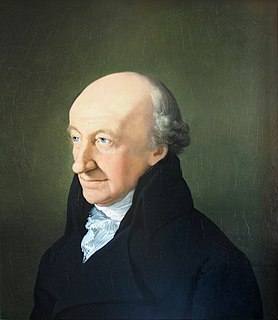A Quote by H. L. Mencken
It is the mission of the pedagogue, not to make his pupils think, but to make them think right, and the more nearly his own mind pulsates with the great ebbs and flows of popular delusion and emotion, the more admirably he performs his function. He may be an ass, but that is surely no demerit in a man paid to make asses of his customers.
Related Quotes
Man cannot survive except through his mind. He comes on earth unarmed. His brain is his only weapon. Animals obtain food by force. man had no claws, no fangs, no horns, no great strength of muscle. He must plant his food or hunt it. To plant, he needs a process of thought. To hunt, he needs weapons,and to make weapons - a process of thought. From this simplest necessity to the highest religious abstraction, from the wheel to the skyscraper, everything we are and we have comes from a single attribute of man -the function of his reasoning mind.
In the first place, the government ought not to be invested with power to control the affections, any more than the consciences of citizens. A man has at least as good a right to choose his wife, as he has to choose his religion. His taste may not suit his neighbors; but so long as his deportment is correct, they have no right to interfere with his concerns.
Good work is no done by "humble" men. It is one of the first duties of a professor, for example, in any subject, to exaggerate a little both the importance of his subject and his own importance in it. A man who is always asking "Is what I do worth while?" and "Am I the right person to do it?" will always be ineffective himself and a discouragement to others. He must shut his eyes a little and think a little more of his subject and himself than they deserve. This is not too difficult: it is harder not to make his subject and himself ridiculous by shutting his eyes too tightly.
As for our pupils talk, let his virtue and his sense of right and wrong shine through it and have no guide but reason. Make him understand that confessing an error which he discovers in his own argument even when he alone has noticed it is an act of justice and integrity, which are the main qualities he pursues; stubbornness and rancour are vulgar qualities, visible in common souls whereas to think again, to change one's mind and to give up a bad case on the heat of the argument are rare qualities showing strength and wisdom.
There is a man who exists as one of the most popular objects of leadership, legislation, and quasi-literature in the history of all men. . . . This man, that object of attention, attack, and vast activity, cannot make himself be heard, let alone understood. He has never been listened to. . . . That man is Black and alive in white America where the media of communication do not allow the delivery of his own voice, his own desires, his own rage.
A child in his earliest years, when he is only two or a little more, is capable of tremendous achievements simply through his unconscious power of absorption, though he is himself still immobile. After the age of three he is able to acquire a great number of concepts through his own efforts in exploring his surroundings. In this period he lays hold of things through his own activity and assimilates them into his mind.
The man who is an initiate of one of the great Mystery Schools never fears to let his pupils outdistance him, because he knows that it stands him in good stead with his superiors if he is constantly sending up to them aspirants who 'make good.' He therefore never tries to hold back a promising pupil, because he has no need to fear that pupil, if allowed to penetrate into the Mysteries, would spy out the nakedness of the land; he will rather bring back a report of its exceeding richness, and thereby confirm the statements of his teacher and spur his fellow pupils to yet greater eagerness.




































